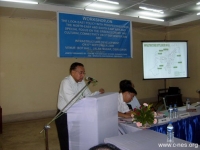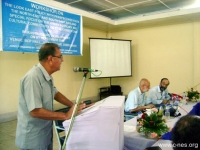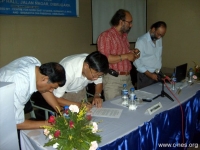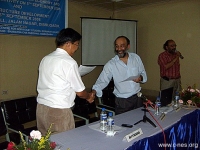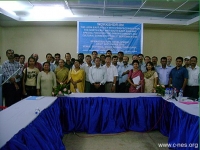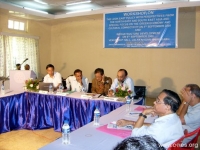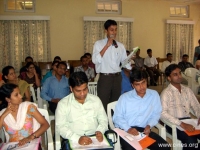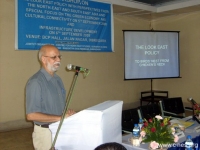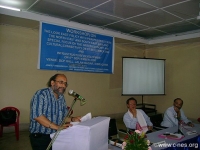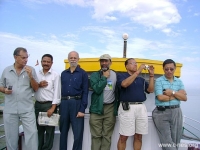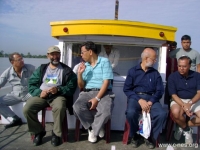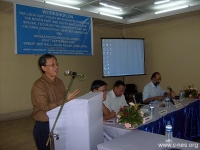‘Look East Policy must be built on base of strong infrastructure’: Workshops in Dibrugarh
Dibrugarh, Sept. 6 – For the Centre’s much-talked about Look East Policy (LEP) to take off, rapid, time bound and visible progress in infrastructure in the North-east is crucial, according to participants at two workshops on the LEP and Infrastructure Gaps in North East India held here.
Speakers at the workshops on September 5 and 6, which were attended by over 100 persons including senior officials, academics, tea, industry professionals, students and civil society members expressed concern about the pressures created by continued illegal migration as well as China’s strategic interests and spoke of the need to protect small and vulnerable communities from regional and international economic pressures.
This last concern was particularly flagged by Prof. Udayon Misra, member of the ICSSR and formerly of Dibrugarh University, who said that opening up “a very complicated region to these pressures” raised questions which required answers by policy makers.
“Will the North-east become a transit zone, a dumping ground for cheap goods – which it is already becoming – and will the cane and bamboo civilization be swamped by plastic civilization?” Prof. Misra asked in his keynote address on Sept. 5.
Participants included Mr. Falguni Rajkumar, the Secretary, North Eastern Council, Meghalaya Chief Secretary Ranjan Chatterjee, Mr. Bhaskar Barua, as well as the former GOC Eastern Command, Kolkata, Lt.-Gen. JR Mukherjee.
Lt.-Gen. Mukherjee sounded a note of caution about China’s stepped up infrastructure campaign on India’s eastern borders. “These roads are not meant for trade but are developed for strategic reasons.” He also advocated a regional approach to flood management with the focus on Assam as the pivotal state through which all major roads and communications links passed.
The Centre for North East Studies and Policy Research organized the workshops in association with the Bharatiya Cha Parishad, which were supported by the Ministry of Development for the North Eastern Region.
“These discussions should be seen as a public response to relevant parts of the NER Vision 2020 document released by the Prime Minister recently,” said Mr. Sanjoy Hazarika, C-NES Managing Trustee.
Mr. Bhaskar Baruah, urged the North-east should provide health and English language skills to the LDC countries of Myanmar, Cambodia and Laos. This could be the “bridgehead” to SE Asia and the export of natural resources from the NE needed to be slowed and eventually stopped and only value added goods extended.
Mr. PD Rai, the deputy chairman of the Sikkim Planning Commission, spoke of how his state was developing a perspective with a strong focus on eco-tourism and the power sector which were expected to bring substantial incomes. He emphasized the need for tourists to feel welcomed by local residents. “It is also an issue of mind sets.” Tourism needed to be developed on a regional level with private enterprise and small players driving it.
Language schools and skills as well as the need for a level playing field were emphasized by Falguni Rajkumar, the Secretary of the North Eastern Council. He focused on the need to organize a coordinated regional response for the region in terms of carbon credits which would enable it to earn significantly from international funds in this sector. Mr. Rajkumar spoke of efforts to bring the IT sector in Bangalore to open offices and branches in the region as another way of building bridges in connectivity.
The noted media commentator Paranjoy Guha-Thakurta, declared that growth was taking place in the region despite challenges and hurdles. He questioned the view by some groups that big dams were a panacea to its energy needs. “The North-east can learn from the mistakes of other states,” Mr. Guha-Thakurta declared, citing the “virtues of pluralism” which were represented in the region.
The meeting felt that, as a practical way of making the LEP relevant to the NER, the Government of India should organize a senior-level sectoral meeting in the region, preferably at the ministerial-level, with the ASEAN partner group.
On the infrastructure front, a discussion arose as to whether infrastructure should be in place before investment came into the region or vice-versa. Some speakers citing the examples of Tea and Oil industries felt that entrepreneurs should initiate the processes instead of waiting for infrastructure to be in place.
Mr. Chatterjee, Chief Secretary of Meghalaya, said that Public Private Partnerships would have to be the principal driver for growth given the enormous funding required to enable the region to catch up with the rest of the country. He also said that prioritization of the education sector, as was Meghalaya’s experience, could push economic growth since education was a service that provided employment, placement and 10 months of activity unlike tourism which provided six months of activity.
Mr. Rai spoke of the internet and mobile technology as keys to the inclusive growth and inclusive governance of which the Vision 2020 document spoke. He made an encouraging and surprising revelation: that Naga artisans were now enhancing their capacity by designing and making high quality Jaipur carpets for the international market.
While Maternal Mortality and Infant Mortality Rates were among the highest in the country, the workshops also heard of the boat clinic initiative for poor and marginalized communities on the islands of the Brahmaputra organized by C-NES in partnership with the National Rural Health Mission which is now being showcased as a best practices case in Assam to India and internationally. The Brahmputra is home to about 25 lakh people on over 2,500 islands.
“Small interventions, clear concepts, good human resources, deliverable outputs are the key,” said Mr. Hazarika, the head of C-NES, saying that the boat clinics had reached about 60,000 persons with sustained health care in five districts and planned to upscale to one lakh coverage by December 2008 and reach ten lakh persons by 2010.
For further details please contact:
Bhaswati Goswami
Communications Officer
C-NES
Tel: 0361-2463962
Email: bhaswatigoswami@yahoo.co.in
